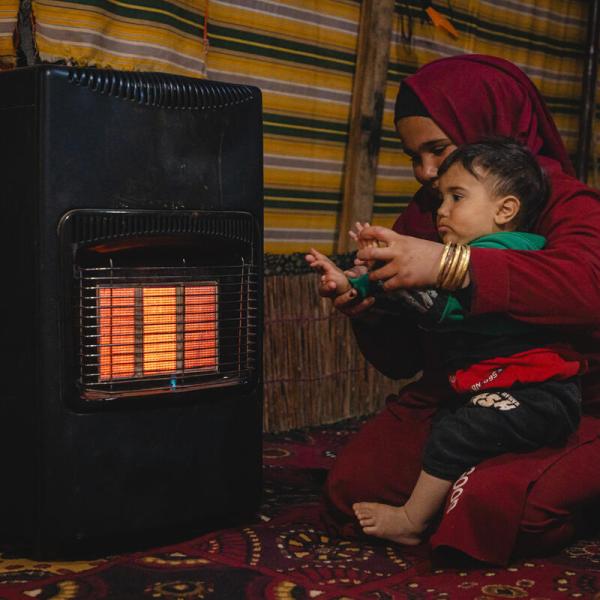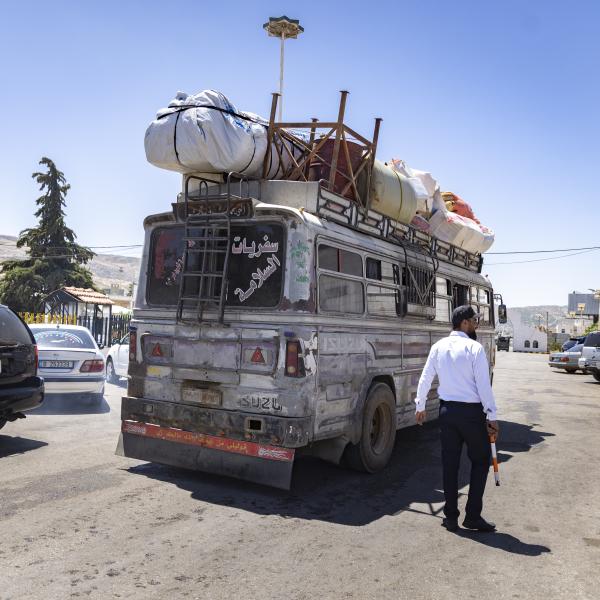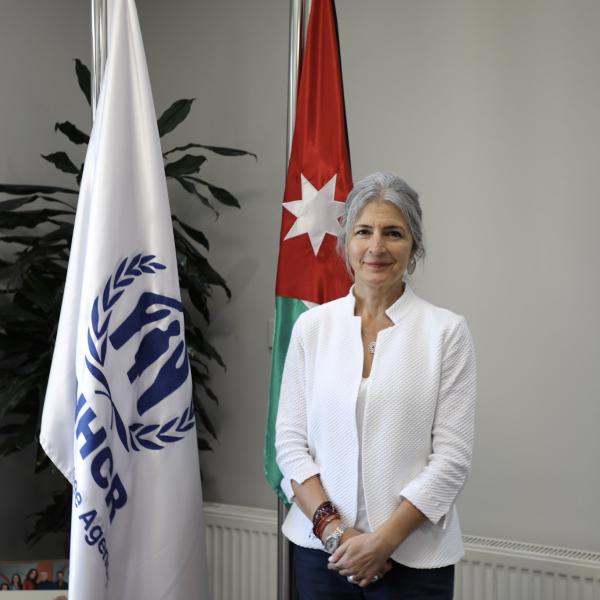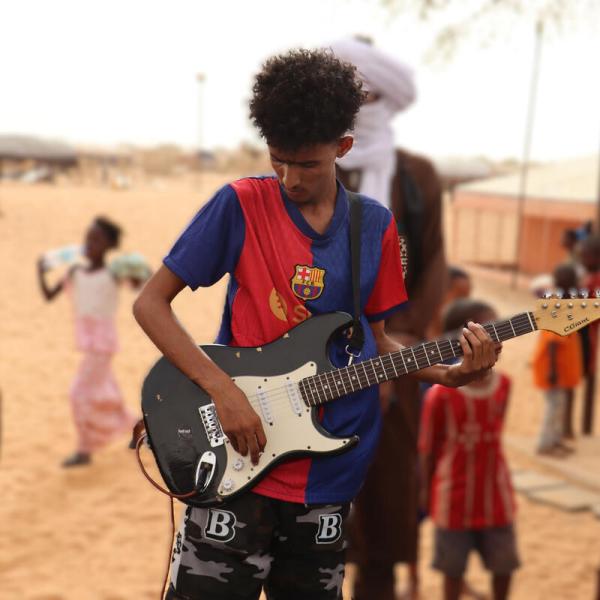There are moments in a career you hope will never come. Yet Maria Stavropoulou, UNHCR representative in Jordan, faces this reality right now: "We have to tell refugees, every day, that there is very little and sometimes nothing, we can do for them."
For over thirty years, this Greek lawyer has dedicated her life to protecting displaced people. From Mauritania to Syria, she has witnessed the evolution of the humanitarian world: the situation today is critical. Now in Amman, she observes a growing gap between needs on the ground and available resources. A gap that forces refugees to make impossible choices.

When hardship becomes the norm
Six out of ten refugees in Jordan can no longer cover their basic daily needs. This figure hides a harsh reality: children must be taken out of school to work, girls are married too young, and families fall into debt because they have no better option. Nine out of ten refugee households now owe money – to their landlord, to hospitals, to the corner shop, and to friends and relatives. These families sacrifice their future to survive one more day.
Jordan hosts 475,000 refugees, mostly Syrian, for over a decade now. This is no longer an emergency: it has become an ongoing reality. And in Zaatari and Azraq camps, the caravans – these converted metal containers that were meant to be temporary – have exceeded their lifespan by several years. They leak, let out the heating that costs so much (that is absolutely needed during the cold winter months) and flood when the first rain comes. But there is no money to replace them.
"Refugees are becoming poorer and poorer, and most see no way out of this poverty."
The human cost of budget cuts
Behind the cut programmes are people, children, families. Maria remembers a Sudanese woman she met in a community centre in Jordan. It was a place where refugees could gather and rebuild some kind of social fabric. Despite her difficulties caring for her large family and her children, this woman had a big smile and an energy Maria didn't expect, that defies the logic that we know.
Support for these centres had to be stopped this year due to lack of funding. But refugees continue to gather elsewhere, maintaining these vital connections. "That's what gives me hope," Maria shares.
Yet the impact of budget restrictions is very real: reduced health programmes, limited protection services for victims of violence, rationed legal aid, and longer distances for refugees to obtain essential documents because some UNHCR registration centres had to shut down. And today, as thousands of Syrians wish to return home following the political change in Syria, UNHCR can only offer them minimal assistance.

A return to Syria filled with hope and uncertainty
Since January 2025, 80% of Syrian refugees in Jordan say they want to return home one day. For some, this is already a reality. UNHCR has been able to help around 10,000 people return to Syria: chartered buses, 50 kg of luggage per person. More recently, cash assistance of $100 per person (for refugee camp residents) allows them to organize their own journey, find cheaper transport, pay debt, take more belongings, buy new clothes to celebrate their return, but also to be prepared, as they don’t know what they will find once back in Syria.
"You know how you wear your best clothes for an important event? It's the same thing," Maria observes.
But here's the cruel paradox: some have become too poor to return, even with this help. They remain stuck in limbo, too destitute to leave, with no options to rebuild a future.
"We want to support refugees as we would like to, but the funding simply isn't there."

The tipping point of the humanitarian system
More than thirty years of humanitarian work have taught Maria one thing: international conventions on refugee rights can no longer be taken for granted. "We are at a tipping point," she says. A moment when these fundamental principles are being questioned.
Yet she remains convinced: if these conventions didn't exist, we would need to invent them today. They form the foundation of the international system and the human rights of each one of us.
The number of displaced people has exploded over the past three decades – but humanitarian funding has consistently decreased. An impossible equation that pushes agencies like UNHCR to operate in a state of permanent crisis.
Why help refugees from Switzerland?
Maria Stavropoulou has a clear message for Swiss donors: refugees who stay close to their country of origin have much better chances of returning when conditions allow. Supporting their presence in Jordan preserves this possibility of return. It also prevents them from taking perilous routes to other regions, particularly towards Europe, out of desperation.
"We must support everything that can end this refugee status they have lived in for so long," she insists.
And then there is this reality that Maria shares modestly: despite the criticism, despite the inadequacy of aid, refugees tell her as they leave: "When my family and I really needed it, UNHCR was there for us."

A heartfelt memory from the desert
There is one memory that stays with Maria Stavropoulou. It was in Mauritania, during the COVID period, in a camp in the middle of the desert sheltering nearly 90,000 people. Despite masks and precautions, they organized a dance competition with the refugee community.
The entire camp mobilized. Songs, dances, photos, videos. "The energy and hope generated were unimaginable," she recounts, still moved. A striking contrast with the usual image of refugee camps.
This scene embodies what still gets Maria up every morning: seeing concretely the change that humanitarian work brings to people's lives. "Everything counts. Everything you do. The way you treat a refugee you meet in the street. Your commitment as a volunteer. If you can make a donation, that's wonderful. Every small gesture counts."
FAQ
How many refugees does UNHCR help in Jordan?
Jordan hosts about 475,000 refugees, mainly Syrian. Around 20% live in the Zaatari and Azraq camps, whilst 80% live in urban and rural communities.
Why do Syrian refugees want to return now?
Following the political change in Syria in December 2024, 80% of Syrian refugees in Jordan express the wish to return to their country one day. 165,000 have already started to go back.
What services does UNHCR provide to refugees?
UNHCR coordinates services in refugee camps, provides legal and psychosocial protection, registers refugees, issues essential documents, and offers assistance for voluntary return to those who wish it.
Why are we talking about budget cuts?
The number of refugees worldwide has increased exponentially over the past 30 years, but humanitarian funding has decreased significantly, creating a growing gap between needs and available resources.
How are refugees affected by these restrictions?
Six out of ten refugees can no longer cover their basic needs in Jordan. The consequences include dropping out of school, child labour, early marriage, and massive debt.